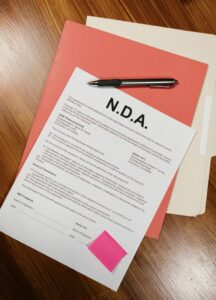AI is transforming hiring, helping you screen resumes and select candidates faster. However, automated tools bring hidden legal risks that can lead to lawsuits, fines, or reputational damage. From bias in algorithms to non-compliance with employment laws, these issues can cost your business thousands. A business attorney can guide you through these challenges. Below are six critical risks of AI hiring and detailed steps to address them, ensuring your recruitment process is safe and legal.
Algorithmic Bias and Discrimination
AI hiring tools can unintentionally discriminate, violating laws like Title VII of the Civil Rights Act. For example, if an algorithm is trained on historical data favoring male candidates for tech roles, it may reject qualified women, leading to discrimination claims. In 2022, a company faced a $1.5 million lawsuit after its AI tool excluded older applicants based on biased resume patterns. The Equal Employment Opportunity Commission (EEOC) reported a 30% rise in AI-related discrimination complaints since 2020.
To avoid this, audit your AI tool’s data sources before use. Ensure training data includes diverse candidates across gender, race, age, and disability status. For instance, remove biased keywords like “young” or “male” from job descriptions feeding the algorithm. Regularly test the tool’s outcomes, checking rejection rates for protected groups to spot disparities.
Work with vendors who prioritize fairness, demanding transparency on how their AI models are built. Document your audits and adjustments to show compliance in case of an EEOC investigation. Include human oversight, like a final review of AI-selected candidates, to catch biases the system might miss.
An attorney can review your AI tool’s compliance with anti-discrimination laws, draft policies for fair use, and defend you in lawsuits, reducing the risk of costly penalties and protecting your reputation.

Non-Compliance with Labor Laws
AI hiring tools must comply with federal and state labor laws, but many fail to meet requirements like the Fair Labor Standards Act (FLSA) or state-specific hiring regulations. For example, some tools automatically reject candidates based on salary expectations without considering minimum wage laws, leading to violations. A retail chain paid $200,000 in fines in 2023 for using an AI tool that violated California’s pay transparency laws by not disclosing salary ranges.
To stay compliant, map out all relevant laws before deploying AI tools. For federal laws, ensure compliance with FLSA, Title VII, and the Americans with Disabilities Act (ADA). Check state laws, like Virginia’s ban on using criminal history in initial screenings, to avoid automated rejections that break rules.
Customize your AI tool to align with these laws. For instance, configure it to include salary ranges in job postings or avoid questions about protected characteristics like age or disability. Train your HR team to understand legal requirements and monitor AI outputs for compliance.
Document your compliance efforts, including vendor contracts and tool settings, to prove due diligence in audits. An attorney can audit your AI system, ensure legal alignment, and create compliance checklists, keeping you safe from fines and legal challenges.
Data Privacy Violations
AI hiring tools collect sensitive candidate data, like resumes and social media profiles, raising privacy risks under laws like the General Data Protection Regulation (GDPR) or the California Consumer Privacy Act (CCPA). If your tool scrapes data without consent or stores it insecurely, you could face fines up to $7,500 per violation. A tech firm was fined $1 million in 2024 for failing to secure applicant data, leading to a data breach.
To avoid violations, obtain explicit candidate consent before collecting data, using clear opt-in forms on your application portal. Ensure your AI vendor complies with GDPR, CCPA, and other privacy laws, verifying their data encryption and storage practices. Limit data collection to essential information, like skills and experience, avoiding unnecessary details like social media activity.
Implement a data retention policy, deleting candidate data after a set period, like six months, unless required for legal reasons. Conduct regular security audits to identify vulnerabilities, costing $1,000-$5,000 annually but saving millions in fines.
An attorney can draft privacy policies, review vendor contracts, and ensure compliance with data protection laws, protecting your business from breaches and penalties while maintaining candidate trust.

Lack of Transparency
Many AI tools lack transparency, making it hard to explain hiring decisions to candidates or regulators. Laws like New York City’s Local Law 144 require employers to disclose AI use in hiring and conduct bias audits, with non-compliance fines up to $1,500 per violation. If candidates challenge rejections, opaque AI processes can lead to lawsuits, as seen when a job seeker won $100,000 after a company couldn’t justify an AI-driven rejection.
To ensure transparency, use AI tools that provide clear decision-making logs, detailing why candidates were selected or rejected. Share a summary of your AI process with applicants, like a notice on your career page explaining that AI screens resumes based on skills and experience.
Conduct annual bias audits, as required in some jurisdictions, and publish results to show compliance. Engage candidates by offering feedback on rejections, like listing missing qualifications, to reduce complaints. Train your HR team to explain AI decisions in simple terms.
An attorney can help you comply with transparency laws, draft disclosure notices, and prepare for audits, ensuring your hiring process is clear and defensible against legal challenges.
Inadequate Record-Keeping
AI hiring tools generate data that must be retained for legal compliance, but poor record-keeping can lead to trouble. Federal laws, like EEOC regulations, require you to keep hiring records for one year, or longer if a complaint is filed. If your AI tool doesn’t store decision data or you fail to maintain records, you could face penalties during audits, costing $10,000 or more. A logistics firm lost a $500,000 lawsuit in 2023 due to missing AI hiring records.
To address this, implement a record-keeping system for all AI-driven hiring decisions. Store data like candidate applications, AI scores, and rejection reasons in a secure database. Use cloud-based HR software, costing $500-$2,000 yearly, to organize records and ensure accessibility.
Set a retention schedule, keeping records for at least one year or longer for ongoing disputes. Train your team to document AI tool settings and audit results. Back up data regularly to prevent loss from system failures.
An attorney can create a record-keeping policy, ensure compliance with federal and state laws, and defend you in audits, reducing the risk of penalties and ensuring your hiring process is legally sound.

Failure to Accommodate Disabilities
AI tools can violate the ADA by failing to accommodate candidates with disabilities. For example, if your AI system requires online assessments inaccessible to visually impaired applicants, you could face lawsuits. A company paid $250,000 in 2024 after its AI tool rejected disabled candidates due to incompatible testing formats. The EEOC notes that 15% of ADA complaints now involve AI hiring tools.
To comply with the ADA, ensure your AI tool supports accessible formats, like screen-reader-compatible applications. Offer alternative assessment methods, such as phone interviews, for candidates who can’t use online systems. Test your tool with disability advocacy groups to identify barriers, costing $1,000-$3,000 but preventing lawsuits.
Train your HR team on ADA requirements, emphasizing accommodations in hiring. Include a clause in your job postings inviting candidates to request accommodations, showing compliance and goodwill.
An attorney can review your AI tool for ADA compliance, draft accommodation policies, and represent you in disputes, ensuring your hiring process is inclusive and legally protected.

Creating a Safe AI Hiring Strategy
To manage AI hiring risks, develop a comprehensive strategy. Start by auditing your current AI tools, checking for bias, compliance, privacy, transparency, record-keeping, and accessibility issues. Select vendors with proven compliance records, reviewing their certifications and audit reports before signing contracts.
Create an AI hiring policy for your team, outlining legal requirements and best practices. Train HR staff annually on anti-discrimination, privacy, and ADA laws, costing $2,000-$5,000 but reducing errors. Use a checklist for AI deployment, ensuring each tool meets federal and state regulations.
Conduct regular compliance reviews with an attorney to stay updated on laws like Local Law 144 or CCPA. Monitor AI performance monthly, analyzing rejection patterns to catch biases early. Document all actions, from audits to training, to show due diligence in legal challenges.
Engage candidates transparently, explaining AI use and offering feedback. Use human oversight to review AI decisions, ensuring fairness. A strong strategy minimizes risks, keeps your hiring legal, and protects your business’s reputation.

Protect Your Business from AI Hiring Risks
AI hiring tools offer efficiency but bring serious legal risks like discrimination, non-compliance, and privacy violations. By addressing these issues, you safeguard your business. A startup attorney provides legal counsel services for businesses, ensuring your AI hiring is compliant. For expert help from a business litigation attorney, contact Jabaly Law to schedule a consultation today.
















